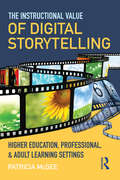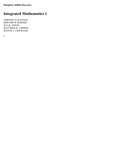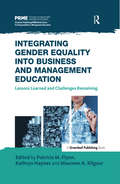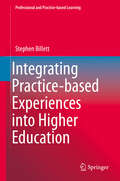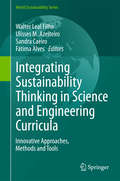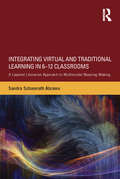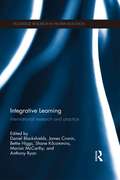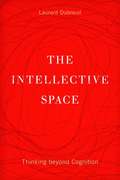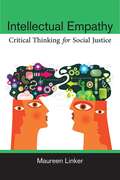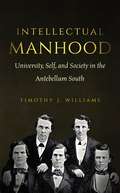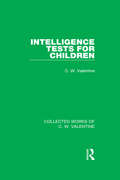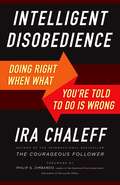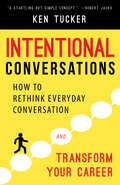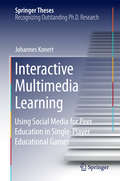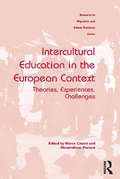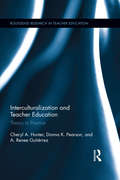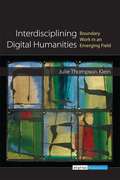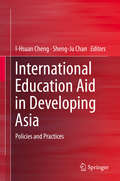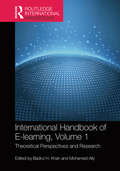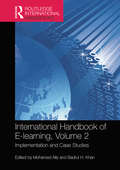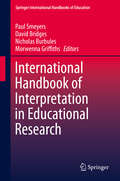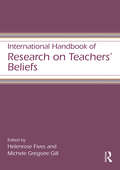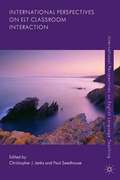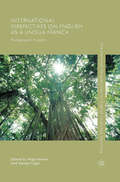- Table View
- List View
The Instructional Value of Digital Storytelling: Higher Education, Professional, and Adult Learning Settings
by Patricia McGeeAlthough storytelling has been recognized as an effective instructional strategy for some time, most educators are not informed about how to communicate a story that supports learning—particularly when using digital media. The Instructional Value of Digital Storytelling provides a broad overview of the concepts and traditions of storytelling and prepares professors, workplace trainers, and instructional designers to tell stories through 21st century media platforms, providing the skills critical to communication, lifelong learning, and professional success. Using clear and concise language, The Instructional Value of Digital Storytelling explains how and why storytelling can be used as a contemporary instructional method, particularly through social media, mobile technologies, and knowledge-based systems. Examples from different sectors and disciplines illustrate how and why effective digital stories are designed with learning theory in mind. Applications of storytelling in context are provided for diverse settings within higher education as well as both formal and informal adult learning contexts.
instructions to presiding officers for conduct of village panchayat elections - zilla panchayat elections
by State Election Commission Goa StateAlmost every one of you have worked at the time of the last General Flections either as a Presiding or as a Polling Officer. The procedure followed by you then is generally adopted during the Panchayat elections. Certain changes have been made during the polling. Such changes as also the salient features of the manner of conducting this election on the polling day arc given
Integrated Math 1: Student Edition 2015 (HMH Integrated Math 1)
by Timothy D. Kanold Edward B. Burger Juli K. Dixon Matthew R. Larson Steven J. LeinwandIntegrating Gender Equality into Business and Management Education: Lessons Learned and Challenges Remaining
by Kathryn Haynes Patricia M. Flynn Maureen A. KilgourThis volume addresses the need to integrate gender equality into business and management education and provides examples of leading initiatives illustrating how this can occur from various disciplinary and global perspectives. Gender inequality has a long history in business schools and the workplace, and traditions are hard to change. Some disciplines remain resolutely gendered, affecting both women and men; and case materials on women leaders and managers are still rare.The chapters provide conceptual and research rationales as to why responsible management education must address the issue of gender equality. They also identify materials and resources to assist faculty in integrating gender issues and awareness into various disciplines and fields. These include specific case studies and innovations that assess or address the role of gender in various educational environments.The book is designed to help faculty integrate the topic of gender equality into their own teaching and research and gain support for the legitimacy of gender equality as an essential management education topic. This is the first book in a series on gender equality as a challenge for business and management education, published with the Principles of Responsible Management Education (PRME) Working Group on Gender Equality.
Integrating Practice-based Experiences into Higher Education
by Stephen BillettThis book advances understandings about and practices for effectively integrating practice-based (e. g. workplace) experiences in higher education programs. This issue is becoming of increasing salient because higher education programs globally are increasingly focussing on preparing students for specific occupations. Such imperatives are reflected in the cooperative education movement in North America, the foundation degree programs of the United Kingdom, the work integrated learning approach within Australian higher education and initiatives in a range of other countries. There are clear and growing expectations that graduates from such should be able to move smoothly into being effective in their occupational practice. These expectations rise from the imperatives and interest of government, employers, community and students themselves. The book achieves a number of important goals. Firstly, it identifies and delineates the educational worth of students and engagement in practice-based experiences and their integration within their programs of study. Secondly, it advances conceptions of the integration of such experiences that is essential to inform how these programs might be enacted. Thirdly, drawing on the findings of two teaching fellowships, it proposed bases and propositions for how experiences in higher education programs might be organised and augmented to support effective learning. Fourthly pedagogic practices seen to be effective in maximising the learning from those practice experiences and integrating them within the curriculum are identified and discussed. Fifthly, a particular focus is given to students' personal epistemologies and how these might be developed and directed towards supporting effective learning within practice settings and the integration of that learning in their university programs.
Integrating Sustainability Thinking in Science and Engineering Curricula
by Walter Leal Filho Ulisses M. Azeiteiro Sandra Caeiro Fátima AlvesIncluding considerations of sustainability in universities' activities has long since become mainstream. However, there is still much to be done with regard to the full integration of sustainability thinking into science and engineering curricula. Among the problems that hinder progress in this field, the lack of sound information on how to actually implement it is prominent. Created in order to address this need, this book presents a wealth of information on innovative approaches, methods and tools that may be helpful in translating sustainability principles into practice.
Integrating Virtual and Traditional Learning in 6-12 Classrooms: A Layered Literacies Approach to Multimodal Meaning Making
by Sandra Schamroth AbramsIntegrating Virtual and Traditional Learning in 6-12 Classrooms introduces a model of "layered literacies" as a framework for describing and illustrating how students’ digital experiences can inform educational methods. Through the lens of layered literacies, educators can envision opportunities to draw upon adolescents’ out-of-school interests and activities to meaningfully integrate digital practices within academic contexts. Such an approach facilitates innovative teaching, inspired learning, and successful pedagogy, and it thoughtfully highlights the role of technology within mandated standards-based instruction in public schools. Combining foundational and contemporary theories, supported by data from multiple studies of adolescent learning, and honoring teachers’ and students’ experiences and resources, this text helps educators reconceptualize the ways students learn through and with digital texts and negotiate the connection between online and offline spaces. A companion website extends the discussion onto the screen, engaging readers in an intertextual approach to learning that complements the concept of layering literacies across disciplines. With a foreword by Jennifer Rowsell and an afterword by Bill Cope and Mary Kalantzis, it will be of interest to experienced educators and administrators, as well as postgraduate, graduate, and undergraduate students of education.
Integrative Learning: International research and practice (Routledge Research in Higher Education)
by Daniel Blackshields James G. R. Cronin Bettie Higgs Shane Kilcommins Marian McCarthy Anthony RyanCurrent teaching, learning and assessment practices can lead students to believe that courses within a programme are self-sufficient and separate. Integrative Learning explores this issue, and considers how intentional learning helps students become integrative thinkers who can see connections in seemingly disparate information, and draw on a wide range of knowledge to make decisions. Written by international contributors who engaged reflectively with their teaching and their students’ learning, the book seeks to develop a shared language of integrative learning, encouraging students to adapt skills learned in one situation to problems encountered in another, and make autonomous connections across courses, between experiences, and throughout their lives. More informed teachers can help students develop the necessary attributes for intentional learning, which include having a sense of purpose, fitting fragmentary information into a ‘learning framework’, understanding something of their own learning processes, asking probing questions, reflecting on their own choices, and knowing when to ask for help. Integrative Learning draws on international research and vast studies to provide the reader with the resources to ensure access to a unified learning experience. The book discusses conceptual and technical tools necessary for facilitating integrative learning across a range of disciplines as well as providing learning pedagogies and considers integrative learning in the context of the relevance of higher education in the complexity and uncertainty of the 21st century. It will appeal to academics and researchers in the field of higher education, as well as those generating higher education curriculums.
The Intellective Space: Thinking beyond Cognition
by Laurent DubreuilThe Intellective Space explores the nature and limits of thought. It celebrates the poetic virtues of language and the creative imperfections of our animal minds while pleading for a renewal of the humanities that is grounded in a study of the sciences.
Intellectual Empathy: Critical Thinking For Social Justice
by Maureen LinkerIntellectual Empathy provides a step-by-step method for facilitating discussions of socially divisive issues. Maureen Linker, a philosophy professor at the University of Michigan–Dearborn, developed Intellectual Empathy after more than a decade of teaching critical thinking in metropolitan Detroit, one of the most racially and economically divided urban areas, at the crossroads of one of the Midwest’s largest Muslim communities. The skills acquired through Intellectual Empathy have proven to be significant for students who pursue careers in education, social work, law, business, and medicine. Now, Linker shows educators, activists, business managers, community leaders—anyone working toward fruitful dialogues about social differences—how potentially transformative conversations break down and how they can be repaired. Starting from Socrates’s injunction know thyself, Linker explains why interrogating our own beliefs is essential. In contrast to traditional approaches in logic that devalue emotion, Linker acknowledges the affective aspects of reasoning and how emotion is embedded in our understanding of self and other. Using examples from classroom dialogues, online comment forums, news media, and diversity training workshops, readers learn to recognize logical fallacies and critically, yet empathically, assess their own social biases, as well as the structural inequalities that perpetuate social injustice and divide us from each other.
Intellectual Manhood
by Timothy J. WilliamsIn this in-depth and detailed history, Timothy J. Williams reveals that antebellum southern higher education did more than train future secessionists and proslavery ideologues. It also fostered a growing world of intellectualism flexible enough to marry the era's middle-class value system to the honor-bound worldview of the southern gentry. By focusing on the students' perspective and drawing from a rich trove of their letters, diaries, essays, speeches, and memoirs, Williams narrates the under examined story of education and manhood at the University of North Carolina, the nation's first public university.Every aspect of student life is considered, from the formal classroom and the vibrant curriculum of private literary societies to students' personal relationships with each other, their families, young women, and college slaves. In each of these areas, Williams sheds new light on the cultural and intellectual history of young southern men, and in the process dispels commonly held misunderstandings of southern history. Williams's fresh perspective reveals that students of this era produced a distinctly southern form of intellectual masculinity and maturity that laid the foundation for the formulation of the post-Civil War South.
Intelligence Tests for Children (Collected Works of C.W. Valentine)
by C.W. ValentineOriginally published in 1945, this title was intended mainly for use by teachers wishing to test children from ages 2-8 in order to establish their intelligence. Based on feedback to the author, this revised edition also includes tests for children up to the age of 15. The tests were used to give a teacher some idea of how much could be expected of each child, so that the class, when practicable, could be divided into groups of varying abilities, which could proceed at paces suited to their respective capacities. It was felt that if ‘inborn intellectual deficiencies’ could be identified at an early age the children could have ‘special treatment’, or in certain cases be placed in a ‘special school’, rather than be potentially written off as ‘lazy’. Today this can be read and enjoyed in its historical context.
Intelligent Disobedience
by Philip Zimbardo Ira ChaleffWhen It's Smart to Say NoNearly every week we read about a tragedy or scandal that could have been prevented if individuals had said no to ill-advised or illegitimate orders. In this timely book, Ira Chaleff explores when and how to disobey inappropriate orders, reduce unacceptable risk, and find better ways to achieve legitimate goals.The inspiration for the book, and its title, comes from the concept of intelligent disobedience used in guide dog training. Guide dogs must recognize and resist a command that would put their human and themselves at risk and identify safer options for achieving the goal. This is precisely what Chaleff helps humans do. Using both deeply disturbing and uplifting examples, as well as critical but largely forgotten research, he shows how to create a culture where, rather than "just following orders," people hold themselves accountable to do the right thing, always.
Intentional Conversations: How to Rethink Everyday Conversation and Transform Your Career
by Ken TuckerUsing six steps and a "SECRET" formula, international speaker, Fortune 500 strategist, and bestselling management author Ken Tucker explores the challenging skill sets required to navigate conflict and crucial conversations effectively. Drawing upon decades of experience in the corporate and government worlds, Tucker teaches leaders how to say what they really need to say and say it right so that their people and organizations execute the results they want and need. Intentional Conversations includes:Context and conversations that lead to good results and those that don't.How leaders can use the "SECRET" process to enhance their success at work and in life.Creative sidebars and QR media links that illustrate the principles in the book.
Interactive Multimedia Learning
by Johannes KonertThis book introduces new concepts and mechanisms regarding the usage of both social media interactions and artifacts for peer education in digital educational games. Digital games in general, and digital educational games in particular, represent an area with a high potential for interdisciplinary innovation, not only from an information technology standpoint, but also from social science, psychological and didactic perspectives. This book presents an interdisciplinary approach to educational games, which is centered on information technology and aims at: (1) improving digital management by focusing on the exchange of learning outcomes and solution assessment in a peer-to-peer network of learners; (2) achieving digital implementation by using forms of interaction to change the course of educational games; and (3) providing digital support by fostering group-formation processes in educational situations to increase both the effects of educational games and knowledge exchange at the individual level. In addition to a systematic analysis of the relationship between software architecture, educational games and social media applications, the book also presents the implemented IT systems' architectures and algorithmic solutions as well as the resulting applicable evaluation findings from the field of interactive multimedia learning.
Intercultural Education in the European Context: Theories, Experiences, Challenges (Research in Migration and Ethnic Relations Series)
by Marco Catarci Massimiliano FiorucciThis book offers a comparative analysis of the intercultural theories and practices developed in the European context. Bringing together work on the United Kingdom, France, Germany, Italy, Spain, Greece, The Netherlands and Sweden, it examines specific approaches to intercultural education. Structured around a series of core questions concerning the main features of diverse groups of migrants present within a country and within schools, the major issues raised by scientific research on the presence of migrant students, and the adoption of relevant educational policies and practices to address these issues - together with examples of best practice in each case - Intercultural Education in the European Context explores the strengths and weaknesses of the intercultural education approach adopted in each context. Offering a broad framework for the study of intercultural education as adopted in European settings, the book highlights the contribution of education to the development of a fair, democratic and pluralistic Europe. As such, it will appeal to scholars and policy makers in the field of sociology, migration, education and intercultural relations.
Interculturalization and Teacher Education: Theory to Practice (Routledge Research in Teacher Education #2)
by Cheryl Hunter Donna PearsonInstitutions of higher education are keen to improve teachers’ intercultural experiences, communication, and understanding, but offer few resources for bringing the research literature to direct application in teacher education programs. This volume addresses that gap by examining what intercultural exchanges in teacher education look like, why they are important, and how they can be maintained. The authors examine how socio-cultural beliefs, institutional structures, and external accreditation bodies interact in the process of interculturalization, highlighting the incentives and barriers as well as strategies to implement and maintain interculturalization projects. Highlighting pragmatic examples, this book addresses the challenges and benefits of interculturalization that can be applied to teacher education programs from both a theoretical and practitioner perspective.
Interdisciplining Digital Humanities: Boundary Work In An Emerging Field
by Julie Thompson KleinInterdisciplining Digital Humanities sorts through definitions and patterns of practice over roughly sixty-five years of work, providing an overview for specialists and a general audience alike. It is the only book that tests the widespread claim that Digital Humanities is interdisciplinary. By examining the boundary work of constructing, expanding, and sustaining a new field, it depicts both the ways this new field is being situated within individual domains and dynamic cross-fertilizations that are fostering new relationships across academic boundaries. It also accounts for digital reinvigorations of "public humanities" in cultural heritage institutions of museums, archives, libraries, and community forums.
International Education Aid in Developing Asia
by I-Hsuan Cheng Sheng-Ju ChanThis book provides an Asian perspective on the timely, urgent questions of how international education aid and development should move forward and what development roles Asia should play, especially following the end of the UN Millennium Development Goals (MDGs) and Education for All (EFA) in 2015. To answer these questions, four separate but interwoven parts, which analyze and anchor education MDGs and EFA policies and practices by means of diverse case studies of donor states, recipient states, and states with a dual and transitional role in Asia, are addressed. On the basis of the analyses, a clearer and concrete direction for effectively and sustainably extending international education aid and development beyond 2015 can be derived.
International Handbook of E-Learning Volume 1: Theoretical Perspectives and Research (Routledge International Handbooks of Education)
by Mohamed Ally Badrul H. KhanThe International Handbook of e-Learning, Volume 1 provides a comprehensive compendium of research and theory in all aspects of e-learning, one of the most significant ongoing global developments in the entire field of education. Covering history, design models, instructional strategies, best practices, competencies, evaluation, assessment, and more, these twenty-seven contributions tackle the tremendous potential and flexibility inherent to this rapidly growing new paradigm. Past and present empirical research frames each chapter, while future research needs are discussed in relation to both confirmed practice and recent changes in the field. The book will be of interest to anyone seeking to create and sustain meaningful, supportive learning environments within today’s anytime, anywhere framework, from teachers, administrators, and policy makers to corporate and government trainers.
International Handbook of E-Learning Volume 2: Implementation and Case Studies (Routledge International Handbooks of Education)
by Mohamed Ally Badrul H. KhanThe International Handbook of e-Learning, Volume 2 provides a comprehensive compendium of implementation and practice in all aspects of e-learning, one of the most significant ongoing global developments in the entire field of education. Covering the integration, challenges, implications, and context-appropriate use of open education networks, blended learning, mobile technologies, social media, and other platforms in a variety of unique international settings, these thirty contributions illustrate the wide-ranging applications and solutions made possible by this rapidly growing new paradigm. Case studies are driven by empirical research and attention to cultural specificity, while future research needs are discussed in relation to both confirmed practice and recent changes in the field. The book will be of interest to anyone seeking to create and sustain meaningful, supportive learning environments within today’s anytime, anywhere framework, from teachers, administrators, and policy makers to corporate and government trainers.
International Handbook of Interpretation in Educational Research
by Paul Smeyers David Bridges Nicholas C. Burbules Morwenna GriffithsThis handbook focuses on the often neglected dimension of interpretation in educational research. It argues that all educational research is in some sense 'interpretive', and that understanding this issue belies some usual dualisms of thought and practice, such as the sharp dichotomy between 'qualitative' and 'quantitative' research. Interpretation extends from the very framing of the research task, through the sources which constitute the data, the process of their recording, representation and analysis, to the way in which the research is finally or provisionally presented. The thesis of the handbook is that interpretation cuts across the fields (both philosophically, organizationally and methodologically). By covering a comprehensive range of research approaches and methodologies, the handbook gives (early career) researchers what they need to know in order to decide what particular methods can offer for various educational research contexts/fields. An extensive overview includes concrete examples of different kinds of research (not limited for example to 'teaching' and 'learning' examples as present in the Anglo-Saxon tradition, but including as well what in the German Continental tradition is labelled 'pädagogisch', examples from child rearing and other contexts of non-formal education) with full description and explanation of why these were chosen in particular circumstances and reflection on the wisdom or otherwise of the choice - combined in each case with consideration of the role of interpretation in the process. The handbook includes examples of a large number of methods traditionally classified as qualitative, interpretive and quantitative used across the area of the study of education. Examples are drawn from across the globe, thus exemplifying the different 'opportunities and constraints' that educational research has to confront in different societies.
International Handbook of Research on Teachers' Beliefs (Educational Psychology Handbook)
by Helenrose Fives Michele Gregoire GillTeacher beliefs play a fundamental role in the education landscape. Nevertheless, most educational researchers only allude to teacher beliefs as part of a study on other subjects. This book fills a necessary gap by identifying the importance of research on teacher beliefs and providing a comprehensive overview of the topic. It provides novices and experts alike a single volume with which to understand a complex research landscape. Including a review of the historical foundations of the field, this book identifies current research trends, and summarizes the current knowledge base regarding teachers’ specific beliefs about content, instruction, students, and learning. For its innumerable applications within the field, this handbook is a necessity for anyone interested in educational research.
International Perspectives on ELT Classroom Interaction
by Christopher J. Jenks Paul SeedhouseThe last few decades have seen an increase in interest in classroom interaction, and this has coincided with the global spread of ELT. This book gathers together 11 empirical-based studies of classroom interaction carried out in different countries, including the USA, England, Kenya, Sweden, and China. Implementing methodologies including conversation analysis, corpus-based analysis and discourse analysis, and covering investigatory issues such as CLIL, multilingualism and computer-assistedlanguage learning, each chapter provides cutting-edge accounts of classroom issues and challenges. Along with a state-of-the-art literature review, the chapters provide key insights and engagement priorities that will prove relevant to a variety of learning and teaching contexts.
International Perspectives on English as a Lingua Franca: Pedagogical Insights (International Perspectives on English Language Teaching)
by Hugo Bowles Alessia CogoThis collection brings new insight into the relationship between English as a lingua franca and language teaching. It explores how the pedagogy of intelligibility, culture and language awareness, as well as materials analysis and classroom management, can be viewed from an ELF perspective in school and university contexts.
